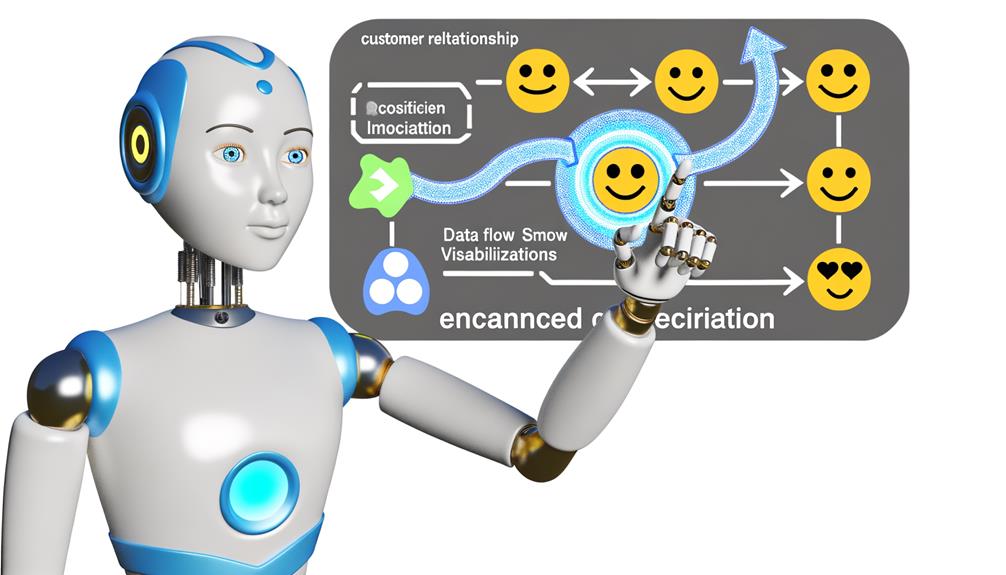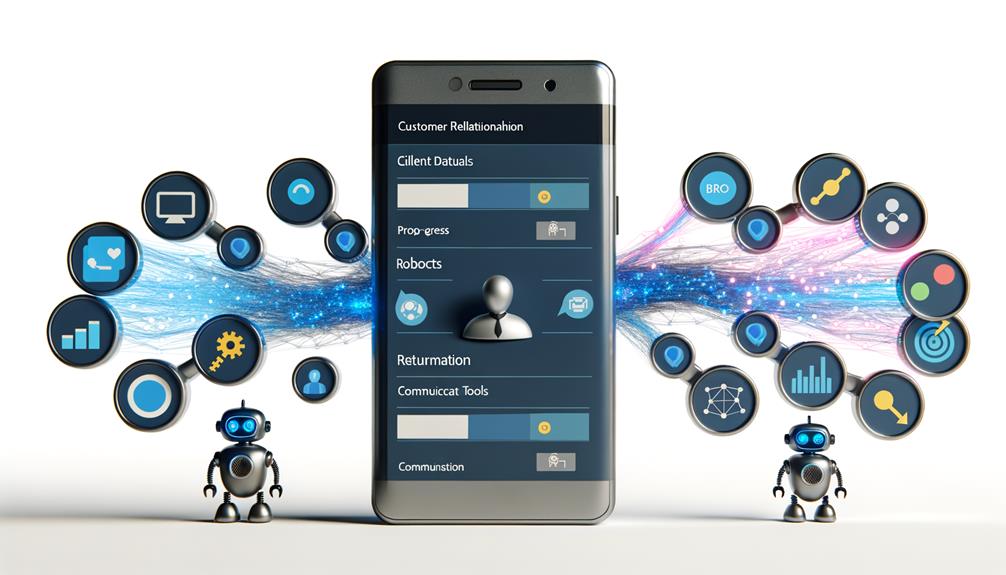AI is transforming your CRM experience by automating repetitive tasks, predicting customer behaviors, and crafting personalized marketing strategies. It's reshaping sales and marketing, enhancing customer support, and providing crucial insights to guide decision-making. By analyzing customer data, AI helps in precise segmentation and formulating dynamic pricing strategies. This tech revolution isn't just about efficiencies—it's making the entire CRM interaction hyper-personalized. As AI in CRM evolves, it promises to reveal even deeper insights into customer behavior and open new possibilities in handling customer relations, you're sure to find the details fascinating.
Understanding AI in CRM Context

In the context of CRM, you'll find that AI greatly enhances the user experience by delivering personalized recommendations, automating repetitive tasks, and predicting customer behaviors and needs. Artificial Intelligence (AI) in CRM systems transform them into dynamic tools that revolutionize customer engagement. By analyzing customer data, AI allows businesses to tailor their interactions proactively. This predictive capability not only improves efficiency but also boosts productivity and fosters informed decision-making. Similarly, the integration of AI into CRM systems streamlines processes by automating repetitive tasks, freeing up time for users and sales teams. Through these advancements, AI has the potential to reshape CRM, offering a truly personalized user experience that is both efficient and effective.
AI-Driven Customer Data Analysis
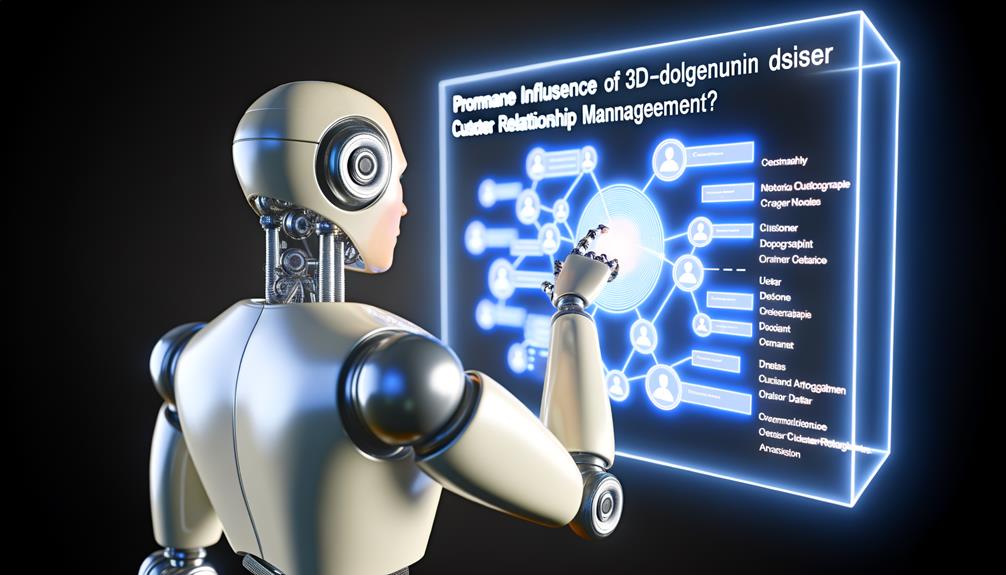
You're now stepping into the domain of AI-driven customer data analysis. This is where AI's role in analytics becomes crucial, offering precise customer segmentation, predictive behavior analysis, and dynamic pricing strategies. By harnessing these capabilities, businesses can craft personalized marketing strategies that greatly enhance the CRM user experience.
AI's Role in Analytics
Harnessing the power of artificial intelligence, CRM systems have revolutionized the way businesses analyze customer data, enabling them to gather improved insights and make more informed decisions. Through AI-driven data analysis, your business can leverage social media monitoring, behavioral segmentation, and other techniques to enhance customer engagement. AI facilitates deeper understanding of your customer base, allowing for personalized experiences that foster loyalty. Predictive analytics, a key feature of AI, enables churn prediction and dynamic pricing, leading to optimized strategies. Moreover, AI's role in analytics fosters better customer segmentation, ensuring your marketing efforts target the right audience. AI not only enhances CRM user experience but also drives business growth through strategic decision-making.
Predictive Behaviour Analysis
Delving into predictive behavior analysis, AI-driven customer data analysis within CRM has become a game-changer, enabling a more refined collection and processing of data for superior insights. This technology provides:
- Enhanced data collection. AI helps to gather diverse data from various sources quickly and accurately.
- Social media monitoring. It tracks customer interactions and sentiments, assisting in crafting targeted strategies.
- Customer segmentation. AI aids in analyzing behavior, preferences, and feedback for more precise segmentation.
- Predictive analytics. It anticipates customer behavior, providing tailored product recommendations and dynamic pricing.
Such a systematic approach leads to optimized customer engagement, providing proactive solutions. So, keep an eye on these innovations to leverage the power of AI for more personalized marketing.
Personalized Marketing Strategies
In the field of personalized marketing strategies, AI-driven customer data analysis is revolutionizing the way we engage with customers, enabling an unprecedented level of precision in customer segmentation for targeted marketing campaigns. AI's predictive analytics are informing behavioral and persona-based segmentation, creating a highly tailored user experience that aligns with customer preferences. This precision in understanding customer behavior is critical for the design of effective personalized marketing strategies. Additionally, AI recommendations, churn prediction, and dynamic pricing are all tools that help refine these strategies. The result is a more satisfying user experience, with customers feeling understood and valued, and businesses being able to target their marketing efforts more effectively and efficiently.
AI's Role in Sales and Marketing

As you integrate AI into your CRM, you'll find it dramatically reshaping sales and marketing by automating tasks such as lead generation, scoring, and predictive analytics. This disruption changes the game in several ways:
- Personalized Marketing: AI's data analysis allows for targeted customer segmentation. This means more personalized, effective campaigns.
- Enhanced Customer Support: AI-powered chatbots revolutionize customer interaction, providing swift, accurate support.
- Optimized Campaign Management: AI aids in managing your campaigns, ensuring you reach your desired audience with precision.
- Improved User Experience: The predictive analytics of AI in CRM enhance the user experience, making sales and marketing efforts more productive.
Embrace AI's role in sales and marketing to harness these benefits and drive your business forward.
Enhancing Customer Experience With AI
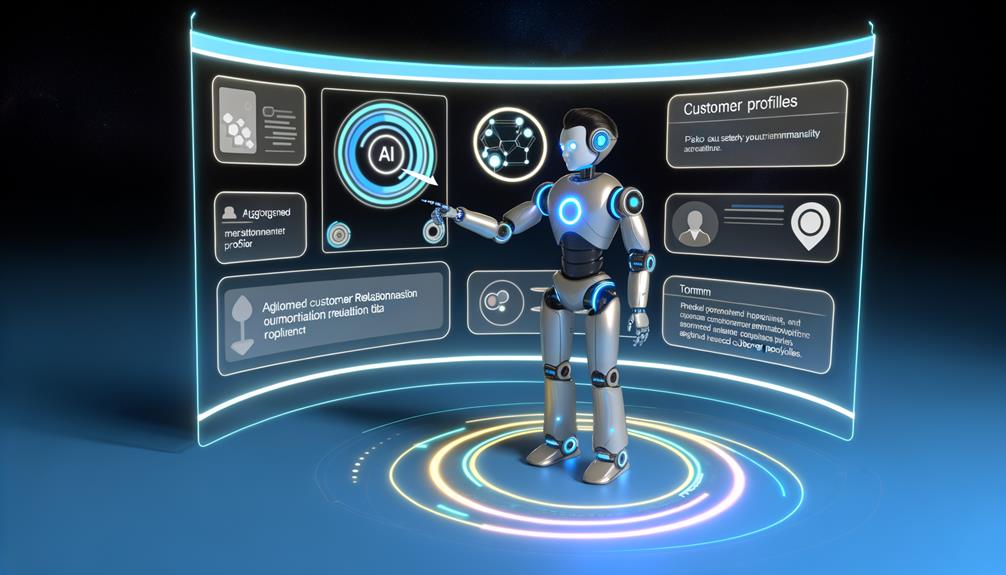
Imagine the impact of AI on your CRM, where intelligent software enhances the user experience through predictive analytics. With AI, your customer interactions become personalized, and even your CRM system can analyze customer data for better segmentation. This leads to more effective, precise marketing campaigns and greatly improved customer satisfaction.
AI's Role in CRM
Harnessing the power of AI, CRM systems can greatly enhance the customer experience. Here's how:
- Personalized Product Recommendations: AI analyzes customer data and behavior, enabling sales teams to provide personalized product recommendations.
- 24/7 Customer Support: AI-powered chatbots, using Natural Language Processing (NLP), offer round-the-clock customer service, boosting customer satisfaction and loyalty.
- Tailored Marketing Campaigns: Machine learning algorithms analyze customer data, enabling CRM systems to execute personalized marketing campaigns that resonate with customers.
- Customer Feedback Analysis: AI can analyze customer feedback, providing proactive solutions and improving service efficiency.
Thus, the integration of AI into CRM is revolutionizing Customer Relationship Management, making interactions more personalized, efficient, and insightful.
Predictive Analysis in UX
Leveraging predictive analysis in UX, you can utilize AI algorithms to accurately anticipate customer behavior and preferences, resulting in a more personalized and engaging user experience. Analyzing past interactions and data, AI can offer tailored experiences and personalized recommendations, creating proactive solutions that cater to anticipating customer needs. This enhances user engagement and satisfaction by delivering relevant content when it's most needed. Additionally, predictive analysis optimizes CRM strategies by predicting trends, identifying opportunities, and mitigating risks. It's this precision that makes AI a powerful tool in CRM, allowing businesses to make strategic decisions based on predicted customer behavior. Embracing this technology, you can elevate your customer's experience, making them feel understood and valued.
Personalized Interactions Through AI
Building on the power of predictive analysis, AI's ability to enable personalized customer interactions is transforming the face of CRM, amping up the user experience to new levels. By tapping into AI in CRM, you can:
- Understand and adapt to customer preferences and behavior patterns.
- Offer tailored recommendations, enhancing customer satisfaction and increasing engagement.
- Provide proactive solutions, based on AI's ability to predict customer needs, improving the user experience.
- Achieve higher customer retention rates, as personalized interactions foster loyalty.
These use cases illustrate how AI, by personalizing interactions, not only elevates the user experience but also drives customer satisfaction, engagement, and retention. It's a game-changer, enabling businesses to build stronger, more profitable customer relationships.
Real-Life Examples of AI in CRM

Often, you'll find compelling examples of AI's impact in CRM, like HubSpot's AI-driven lead scoring system that's boosted conversion rates by 21%, or Sephora's AI-powered chatbots that have halved customer service response times. Analyzing customer data, these AI-powered CRM systems leverage AI algorithms to enhance customer service and marketing strategies.
Here are some examples in tabular form:
| Company | AI Application | Impact |
|---|---|---|
| HubSpot | Lead Scoring System | 21% increase in conversion rates |
| Sephora | AI Chatbots | 50% decrease in response time |
| Netflix | Personalized Marketing Campaigns | 30% increase in customer engagement |
These real-life cases illustrate how leveraging AI enhances customer retention rates and efficiently handles customer queries. They serve as a demonstration to AI's transformative role in modern CRM.
Ethical Considerations in AI-Powered CRM

As we explore the domain of AI-powered CRM, it's important to contemplate the ethical implications, including data privacy, security concerns, and the potential for algorithmic bias.
- Data privacy: With AI's impact on CRM, safeguarding customer data is paramount. Transparency in data handling is key to earning customer trust.
- Security concerns: AI-powered CRM systems must be rigorously secured to prevent breaches that could compromise customer information.
- Algorithmic bias: This can lead to unfair customer interactions. It's important to address these biases in AI algorithms to ensure fair treatment of all customers.
- Human touch: While AI enhances CRM, maintaining a balance with human interaction is crucial for ethical considerations.
Future Trends: AI and CRM Integration
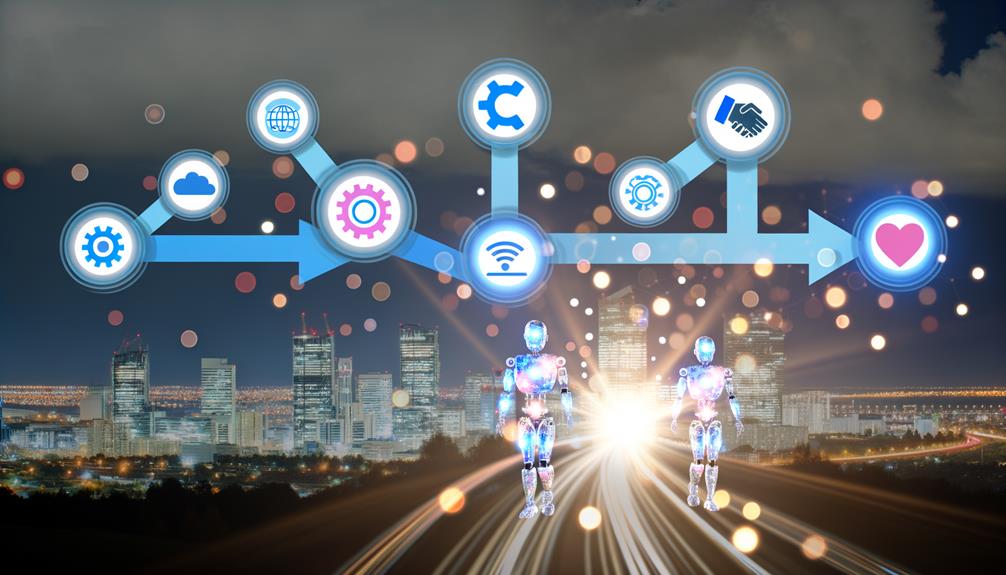
Paving the way for unprecedented advances in customer relationship management, AI integration in CRM is predicted to soar, with a growth rate of 12.3% from 2021 to 2026, fundamentally transforming how businesses interact with their clients. By harnessing AI technology, businesses can gain a competitive advantage, enhancing the customer experience through personalized marketing and valuable insights.
Here's a snapshot of AI's potential impact:
| Predicted Increase | Year | |
|---|---|---|
| Revenue | 15% | 2022 |
| Productivity | 25% | 2024 |
| Customer Satisfaction | 42% | 2023 |
However, privacy regulations pose a challenge to the future of customer interactions. Despite this, AI remains a powerful tool, set to redefine CRM and open up new opportunities.
